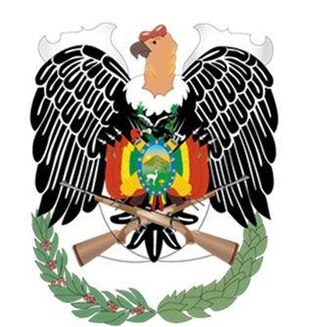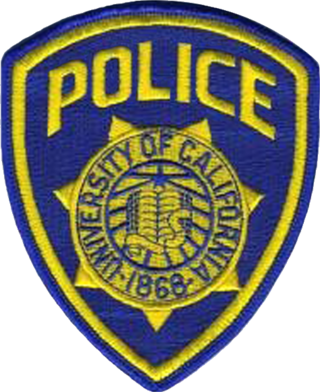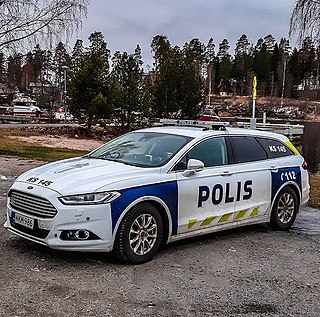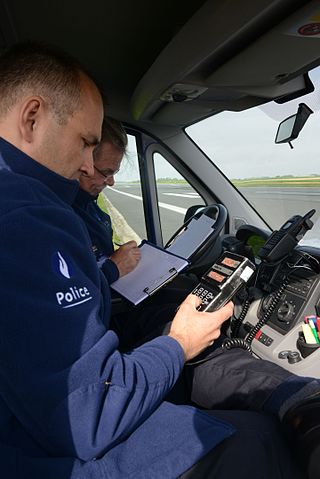
Military police (MP) are law enforcement agencies connected with, or part of, the military of a state. In wartime operations, the military police may support the main fighting force with force protection, convoy security, screening, rear reconnaissance, logistic traffic management, counterinsurgency, and detainee handling.

The Polizia di Stato is one of the national police forces of Italy. Alongside the Carabinieri, it is the main police force for providing police duties, primarily to cities and large towns, and with its child agencies it is also responsible for highway patrol (autostrade), railways (ferrovie), airports (aeroporti), customs, as well as certain waterways, and assisting the local police forces.

The Kosovo Police is the national policing law enforcement agency of Kosovo. It was established in 1999 and took its current form with the 2008 police law. It consists of five departments and eight regional directorates and is represented at the political level by the Ministry of Internal Affairs and Public Administration of the Republic of Kosovo.

The National Police Corps is the national civilian police force of Spain. The CNP is mainly responsible for policing urban areas, whilst rural policing is generally the responsibility of the Civil Guard, the Spanish national gendarmerie force. The CNP operates under the authority of Spain's Ministry of the Interior. They mostly handle criminal investigation, judicial, terrorism and immigration matters. The powers of the National Police Corps varies according to the autonomous community. For example, the Ertzaintza and the Mossos d'Esquadra are the primary police agencies in the Basque Country and Catalonia, respectively. In Navarre they share some duties jointly with Policía Foral (Foruzaingoa).

Law enforcement in Bolivia is reliant on the 40,000-member Cuerpo de Policía Nacional responsible for internal security and maintaining law and order. Unlike many South American countries, the Bolivian police force always has been accountable to the national government rather than to state or local officials. The 1950 Organic Law of Police and Carabiniers officially separated the police from the military. Frequently, however, the national police call upon the military for assistance in quelling riots and civil protests.

The Polícia de Segurança PúblicaMHTE is the national civil police force of Portugal. Part of the Portuguese security forces, the mission of the PSP is to defend Republican democracy, safeguarding internal security and the rights of its citizens. Despite many other functions, the force is generally known for policing urban areas with uniformed police officers, while rural areas are normally policed by National Republican Guard (GNR), the country's national gendarmerie force. PSP is focused in preventive policing, only investigating minor crimes. Investigation of serious crimes falls under the Judicial Police responsibility, which is a separate agency.

The Polícia Judiciária is the national criminal investigation police agency of Portugal, focused in fighting serious crimes, including homicides, kidnapping, organized crime, terrorism, illegal drug trade, corruption, cybercrime and financial crime. It is integrated into the Ministry of Justice, but operates under the supervision of the Public Ministry.

The Federal Police, formerly known as the Policía Federal Preventiva and sometimes referred to in the U.S. as "Federales", was a Mexican national police force formed in 1999. In 2019 it was incorporated into the National Guard and operated under the authority of the Department of Security and Civil Protection.

The police departments of the University of California system are charged with providing law enforcement to each of the system's campuses.

Law enforcement in Finland is the responsibility of several agencies. The Police of Finland, a national police agency, is responsible for most tasks. The two other main agencies are the Finnish Border/Coast Guards and the Finnish Customs. Examples of other agencies with limited policing powers are the Finnish Defence Forces, municipal parking inspectors and railway staff.
The Serbian Police, formally the Police of the Republic of Serbia, is the national civilian police force of the Serbia. The Serbian Police are responsible for all local and national law enforcement. It is under the jurisdiction of the Ministry of Internal Affairs.
Law enforcement in Albania is the responsibility of several agencies. The responsibility for most tasks lies with the Albanian State Police, a national police agency, which is under the authority of Ministry of Internal Affairs. Examples of other agencies with limited policing powers are the Municipal Police, which has administrative functions and operates in the local level. They are controlled by mayors.

In many countries, particularly those with a federal system of government, there may be several law enforcement agencies, police or police-like organizations, each serving different levels of government and enforcing different subsets of the applicable law.

The Belgian Federal Police is the national police force of the Kingdom of Belgium. It carries out specialized and supra-local administrative and judicial police operations, and supports local police services when needed. Additionally, the Federal Police is responsible for patrolling and ensuring the safety of the country's highways. The Federal Police has approximately 12,300 officers and civilian personnel.
Mexico law enforcement is distributed among three distinct powers of authority and jurisdiction: federal, state, and municipal. With the reform of former President; Andres Manuel Lopez Obrador of Mexico’s Federal Police, the agency was replaced with the new National Guard, which serves as a federal ‘military police.’ The main goal of the National Guard is to bring justice and peace to the country. The National Guard was created because some sections of the Federal Police were involved in organized crime, corruption, and similar issues.

The Florida Department of Law Enforcement (FDLE) is a state-wide investigative law enforcement agency within the state of Florida. The department formally coordinates eight boards, councils, and commissions. FDLE's duties, responsibilities, and procedures are mandated through Chapter 943, Florida Statutes, and Chapter 11, Florida Administrative Code. FDLE is headed by a commissioner who reports to the Florida Cabinet, which is composed of the governor, the attorney general, the chief financial officer, and the commissioner of agriculture. The commissioner is appointed to his position by the governor and cabinet and confirmed by the Florida Senate.

Law enforcement in Mexico City is provided by two primary agencies; the Secretariat of Citizen Security of Mexico City, who provides uniformed or preventative police, and the Office of the Attorney General of Mexico City who provides plainclothes detectives and crime lab services.

The Foreigners and Borders Service - SEF was the police service integrated into the Ministry of Internal Affairs, whose mission was to enforce immigration and asylum in Portugal, in accordance with the provisions of constitutional, legal and governmental guidelines.
The National Police of Honduras is the uniformed police force of the Republic of Honduras. The force is organised into regional headquarters, municipal headquarters, headquarters of fixed or mobile stations, and police posts. There are at least 360 police centres throughout Honduras. The National Police of Honduras has its headquarters in Tegucigalpa, the capital city of Honduras. The National Police of Honduras is the fourth largest police body in Central America by number of employees. It is the sixth largest force in Central America by police officers per capita. The force's patroness is the Virgin of Carmen. On 16 July of each year the "National Police Patroness Day" is celebrated.



























